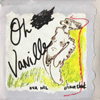Diane Cluck, "Oh Vanille/Ova Nil"

Diane Cluck seems like more of a force of nature than a mere singer/songwriter. She is the rare archetypal artist (without ironic quotes) though whom something pure and true flows, a category in which I’d also include folks like David Tibet, Jandek, and Christina Carter. It doesn’t quite matter which genre such people inhabit, as the sheer force and otherness of their personalities is enough to be compelling regardless of how they cloak themselves in artifice.
2003’s Oh Vanille/Ova Nil was Diane Cluck’s fourth album and her reluctant first for an actual label.Prior to its 2005 reissue on Important, all of her albums were self-released with handmade packaging, an arrangement she was quite happy with.Recording and selling albums is quite simply beside the point for Diane, as she is perfectly content to record only when she feels inspired and derives much more satisfaction from playing live anyway.
I can certainly see her point, as the first time that I saw her live I was utterly transfixed (a truly rare accomplishment for someone holding an acoustic guitar).Nevertheless, her recorded work enables her to use multiple vocal tracks to harmonize with herself, which is one of my favorite elements of her work.She has such an unusual and powerful voice and such an intuitive understanding of how to wield harmony that she can transform seemingly mundane lyrics like "you belong to no one, you are easy to be around" into something fraught with urgency and hidden meaning.Notably, Cluck did not waste any tracks during the recording of Oh Vanille on fleshing out the instrumentation: the vocals are the song, and her acoustic guitar merely serves as its skeleton.It’s a smart move aesthetically, as music like this needs to be raw, intimate, and organic to connect with maximum impact.Also, using only an acoustic guitar creates an illusion of detachment from the present time that serves the music quite well.
The aforementioned "Easy to Be Around" is the album’s most immediately gratifying song due its incredibly strong melodies (it even somehow managed to wind up on the soundtrack to Noah Baumbach’s Margot at the Wedding).Atypically, however, that song is great despite having lyrics that aren’t among Cluck’s best.In general, the most stunning pieces are those where the melodies and the lyrics both connect.The finest example of this is "The Turnaround Road," which manages to make simply sitting at the edge of a road sound like something incredibly dark, harrowing, and profound ("There are snakes I have been warned about, there's rattlers in this roundabout- they come in from the chaparral, they crawl beyond the gravel now").At such times, it doesn't seem like Cluck sat down and wrote a song, but rather that she was absolutely consumed by a feeling that she later managed to shape into something song-like.The final two tracks ("Yr Million Sweetnesses" and "Wild Deer At Dawn") are also quite wonderful, though less cathartic.In fact,"Wild Deer" even shakes up the instrumentation a bit, adding a somber harmonium for the crescendo.
Of course, being a great artist is not necessarily the same as being an infallible one.Sometimes Cluck is able to articulate her intensity to devastating effect, sometimes she misses the mark (though she is never, ever trite or lightweight).Also, listening to an entire Diane Cluck album from start to finish can be a pretty draining and uncomfortably intimate experience ("Have I told you how I like to see a man submit to ecstasy, with all his inhibitions free, and moaning like his mother?"). On a song-by-song basis though, she can be absolutely untouchable and Oh Vanille/Ova Nil contains some of her finest work (though Countless Times makes a strong case for itself as well).
Samples:
 



